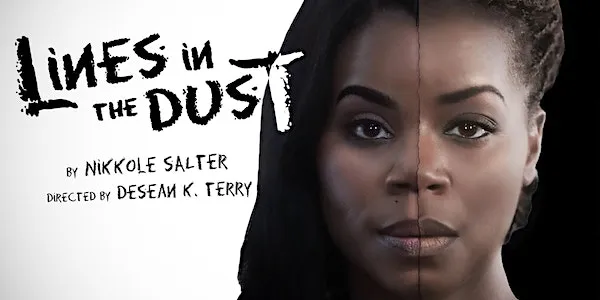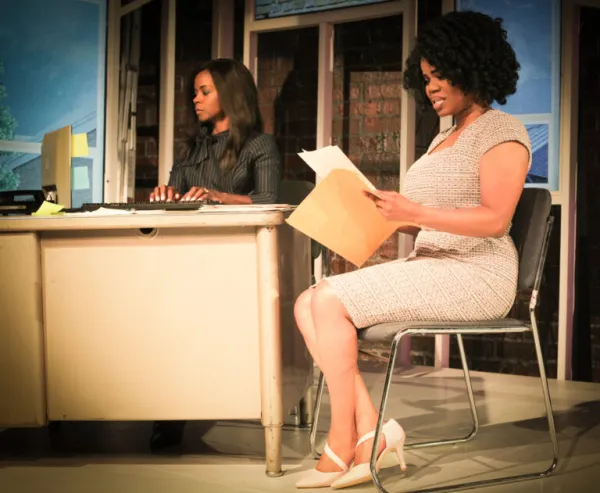At the heart of Pulitzer Prize-nominated and Obie Award-winning playwright Nikkole Salter’s Lines in the Dust is the issue of a quality education for Blacks – just as it was during much of the Civil Rights movement, which was partly inspired by the struggle to desegregate America’s separate and unequal schools, from the Supreme Court’s 1954 Brown v. Board of Education ruling to Medgar Evers’ applying to go to the University of Mississippi to the Little Rock Nine to Gov. George Wallace blocking the schoolhouse door at the University of Alabama, etc. In fact, the title of Salter’s play is derived from Wallace’s 1963 inaugural speech at Montgomery where the pugnacious racist declared: “I draw the line in the dust… Segregation today… Segregation tomorrow… Segregation forever.”
Salter’s compelling play dramatizes the fact that the barriers to blocking Blacks from attending good schools has not been confined to the Jim Crow South of the 1950s and 1960s. Lines in the Dust decidedly does not take place way down yonder in the land of cotton, but rather in Millburn, New Jersey in 2009/2010, a Newark suburb. And it is Michael DiMaggio (Tony Pasqualini) who repeats Wallace’s dusty words, hundreds of miles north of Dixie. To be precise, it is 1,017 miles from Millburn to Montgomery, but in Salter’s incisive drama the emotional distance in terms of racist mentality is much closer than many Northerners may like to admit.
DiMaggio, a retired longtime police detective who was born and raised in Newark, is hired as a private investigator by Millburn’s school board after a school shooting that has rocked the suburban place of learning. Although the play isn’t very clear about these plot points, if I understood correctly, it turns out that the murdered student, tellingly named “Malik,” had been attending the high school illegally, because he did not actually live in the district and lied about his true address. This leads to the decision to hire a P.I. to root out pupils who are not properly zoned to attend the Millburn school, which is believed to offer a better education than nearby Newark’s public schools do. I assume that beneath this anxiety is the sense that by having Blacks from the ghetto attend the mostly white Millburn institution attracts crime. They are, to use a Faulknerian phrase, “intruders in the dust.”
(Another somewhat confusing point is that today, when we hear the term “school shooting” in 2023, we generally think of mass killings/injuries carried out by automatic rifle-toting deranged lone gunmen at schools in place like Sandy Hook and Parkland. This may not automatically have been the case back in 2014, when Dust premiered at the Luna Stage in NJ. In any case, in Salter’s play, only Malik is shot, which DiMaggio automatically assumes is “gang related.”)
DiMaggio’s mission is to crack down on the “scourge” of school residency fraud (as if rooting out fellow students who are apparently so motivated to get a superior education that they are willing to commute greater distances to go to better schools will somehow “protect” white pupils). Like the Yankee slugger his character shares a last name with, the Inspector Javert-like DiMaggio intends to hit a homer in his relentless quest to root out the tiny percentage of students illegally attending Millburn High. Pasqualini, a stage veteran who has also acted in TV programs such as Mad Men and West Wing, impeccably portrays the private dick as an Italian-American stickler for rules and regs with a conservative mindset full of preconceived ideas.
DiMaggio quickly butts heads with the high school’s principal, Beverly (on opening night, she was played by Kelly Jenrette, who alternates in the role with co-star Erica Tazel), who is African American. In addition to the ethnic difference between her and the paternalistic man who insists he be called “Mike” and on calling her (much to her disdain) “Bev,” is a considerable generation gap. Beverly, who is a principal with principles, walks a tightrope, trying to maintain her idealism and at the same time her status and well-paying job.
Beverly’s delicate balancing act is complicated by Denitra (at the LA premiere she was portrayed by Erica Tazel, who switches roles with Jenrette throughout the run). Without giving too much away, Denitra is a duplicitous schemer, but her mendacity can be rationalized – if not excused – in that it is all for a self-sacrificing, noble cause, the betterment of her daughter Noelle (which sounds like “Nikkole,” as in Salter, who earned her BFA at Howard University and MFA at NYU). We should all have parents who, by hook or by crook, are willing to go to bat for their children, come hell or high water or private investigators.
The one-act, two-hour play inevitably leads to collisions between the characters, who have competing interests, ideologies and motivations. Will the hardheaded DiMaggio have a change of heart? When the going gets rough, will the upper middle class Beverly spurn the lower class (but extremely hard working) Denitra in order to save her own hide, once Noelle’s secret is uncovered by the relentless DiMaggio? Or will solidarity prevail over betrayal?
Dust is excellently acted and well directed by Desean Terry, who has previously helmed Rogue Machine’s outstanding Gunshot Medley: Part 1 and Les Blancs, as well as James Baldwin’s Blues for Mr. Charlie. Jenrette has been Emmy nominated for The Handmaid’s Tale, while Tazel has dazzled viewers on FX’s Justified and in Roots, so in addition to Pasqualini, this three-hander provides audiences with stellar performances. Scenic designer Mark Mendelsohn’s set, which is generally divided between Beverly’s office on stage right, and Denitra’s home on stage left, also merits mention, as do projection designer Sean Cawelti’s images, seen on eight big screen TV’s that enhance our sense of place and, at times, history (such as with shots of 1967’s Newark Rebellion).
This is reportedly the first time that one of the LA-born Salter’s full-length plays has been performed on a Los Angeles stage. Her Dust is the inaugural production of Support Black Theatre, which according to the playbill “is a service organization dedicated to capacity-building Black theatres, developing Black artists, and cultivating Black audiences in LA.” Along with Collaborative Artists Bloc, Support Black Theatre’s Collaborative Model is off to a very strong start, and long may it reign.
Lines in the Dust is being performed 8:00 p.m. on Thursdays, at 8:00 p.m. on Fridays at 8:30 p.m., on Saturdays at 2:00 p.m. and 8:00 p.m., and Sundays at 2:00 p.m. and 7:30 p.m., through December 10 at the Matrix Theatre, 7657 Melrose Avenue, L.A., CA, 90048. For reservations call (310)619-6322 or https://LinesintheDust.eventbrite.com.






